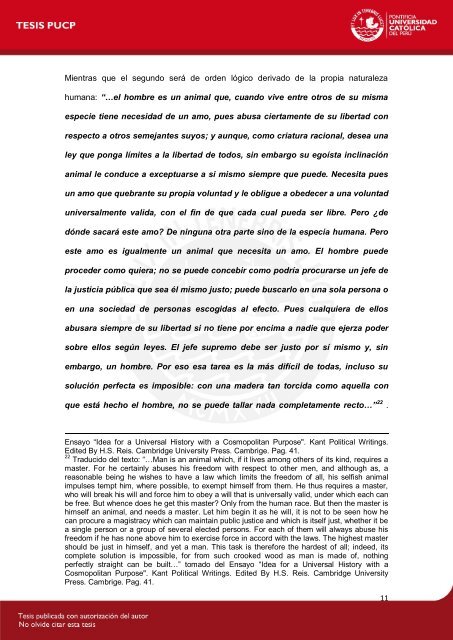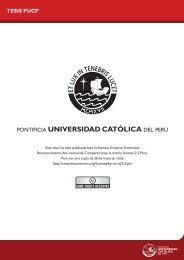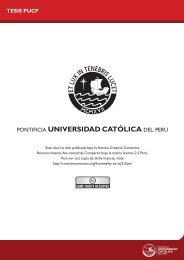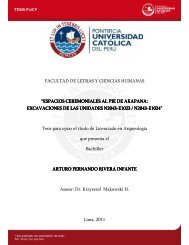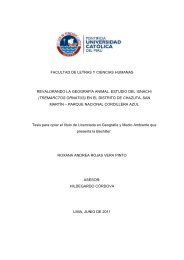Ver/Abrir - Pontificia Universidad Católica del Perú
Ver/Abrir - Pontificia Universidad Católica del Perú
Ver/Abrir - Pontificia Universidad Católica del Perú
Create successful ePaper yourself
Turn your PDF publications into a flip-book with our unique Google optimized e-Paper software.
Mientras que el segundo será de orden lógico derivado de la propia naturaleza<br />
humana: ―…el hombre es un animal que, cuando vive entre otros de su misma<br />
especie tiene necesidad de un amo, pues abusa ciertamente de su libertad con<br />
respecto a otros semejantes suyos; y aunque, como criatura racional, desea una<br />
ley que ponga límites a la libertad de todos, sin embargo su egoísta inclinación<br />
animal le conduce a exceptuarse a si mismo siempre que puede. Necesita pues<br />
un amo que quebrante su propia voluntad y le obligue a obedecer a una voluntad<br />
universalmente valida, con el fin de que cada cual pueda ser libre. Pero ¿de<br />
dónde sacará este amo? De ninguna otra parte sino de la especia humana. Pero<br />
este amo es igualmente un animal que necesita un amo. El hombre puede<br />
proceder como quiera; no se puede concebir como podría procurarse un jefe de<br />
la justicia pública que sea él mismo justo; puede buscarlo en una sola persona o<br />
en una sociedad de personas escogidas al efecto. Pues cualquiera de ellos<br />
abusara siempre de su libertad si no tiene por encima a nadie que ejerza poder<br />
sobre ellos según leyes. El jefe supremo debe ser justo por sí mismo y, sin<br />
embargo, un hombre. Por eso esa tarea es la más difícil de todas, incluso su<br />
solución perfecta es imposible: con una madera tan torcida como aquella con<br />
que está hecho el hombre, no se puede tallar nada completamente recto…‖ 22 .<br />
Ensayo “Idea for a Universal History with a Cosmopolitan Purpose". Kant Political Writings.<br />
Edited By H.S. Reis. Cambridge University Press. Cambrige. Pag. 41.<br />
22 Traducido <strong>del</strong> texto: “…Man is an animal which, if it lives among others of its kind, requires a<br />
master. For he certainly abuses his freedom with respect to other men, and although as, a<br />
reasonable being he wishes to have a law which limits the freedom of all, his selfish animal<br />
impulses tempt him, where possible, to exempt himself from them. He thus requires a master,<br />
who will break his will and force him to obey a will that is universally valid, under which each can<br />
be free. But whence does he get this master? Only from the human race. But then the master is<br />
himself an animal, and needs a master. Let him begin it as he will, it is not to be seen how he<br />
can procure a magistracy which can maintain public justice and which is itself just, whether it be<br />
a single person or a group of several elected persons. For each of them will always abuse his<br />
freedom if he has none above him to exercise force in accord with the laws. The highest master<br />
should be just in himself, and yet a man. This task is therefore the hardest of all; indeed, its<br />
complete solution is impossible, for from such crooked wood as man is made of, nothing<br />
perfectly straight can be built…” tomado <strong>del</strong> Ensayo “Idea for a Universal History with a<br />
Cosmopolitan Purpose". Kant Political Writings. Edited By H.S. Reis. Cambridge University<br />
Press. Cambrige. Pag. 41.<br />
11


